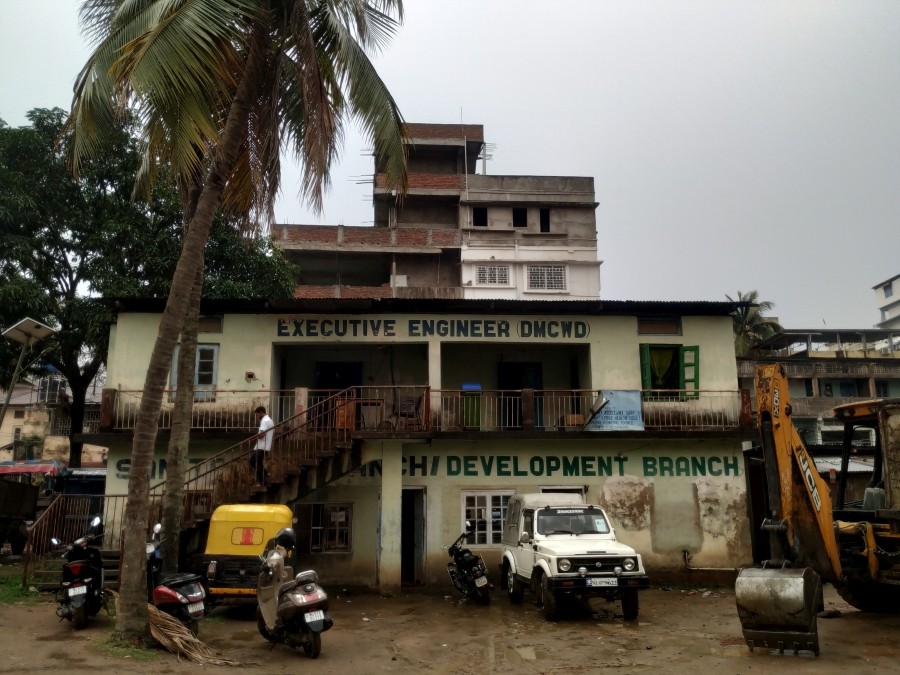Offices of the Executive Engineer and the Sanitation Branch of the Dimapur Municipal Council. (Morung Photo)

DMC's civic duties hindered by revenue constraints
Mongsentong Longkumer
Dimapur | April 1
The Dimapur Municipal Council (DMC) has a sizeable responsibility to carry on its shoulders, with Dimapur being the commercial capital of the state and also the fastest growing city in terms of population. It requires a substantial workforce and other resources to keep it up and running every day, particularly in the areas of garbage collection, maintenance of public property, sanitation and other activities.
However when one visits the office premises of the DMC, a sense of disbelief greets the visitor when looking at the pathetic condition of the administrative buildings. Old and dilapidated with unpaved roads, the buildings appear unfit for a municipal body that has a lot of expectations from the people of Dimapur.
In a recent exclusive interview with The Morung Express, Albert Ezung, Administrator, shared the ins and outs that come with working within the ambit of the DMC. He explained that, ‘The DMC is a self-sustaining autonomous body that is required to generate its own revenue.’ These generally come in the form of toll tax, sanitary tax, issuing trade licence, and house rents generated from property assets which the DMC depend upon.
He also underscored that the taxes and other forms of collections are imposed ‘in accordance with the Nagaland Municipal Act, 2001, section 120, which empowers the urban local bodies to raise their own taxes for generating revenue.’
Further elaborating on revenue collection, the Administrator informed that most of it goes towards payment of salaries to DMC employees and general maintenance. Toll tax, he said, is the main source of revenue and the DMC has been obtaining the toll tax and other entry fees from the entry gate at New Field check gate, Dillai and Khatkati Gate.
He mentioned that collection is not very consistent but monthly collection is around Rs 40-50 lakhs approximately.
However, due to the implementation of the GST, he admits that the act has subsumed all other taxes in the state. ‘For all those items which are covered by GST, we no longer collect taxes so it has also affected our revenue generation. Apart from that we are also realising the vehicle entry tax so these are all done through the notification issued by the state government,’ he said.
On the collection of entry fees, Ezung justified, ‘Whatever activities we are currently doing is in accordance with the law, so there is nothing illegal about that. It is just that there are too many collections perhaps that people are getting mixed up. But people should also understand that the money which is collected by the DMC is just utilised for public service.’
He further underscored that, ‘We are not using it for any other intentions. All the accounts, whatever money is collected from various sources are all subjected to audit by the AG so it is accountable.’
Limited revenue and its impact on sanitation
For Dimapur, garbage generation has also increased quite substantially and around 150 metric tonnes of garbage is disposed daily, according to the Administrator.
‘Our resources are limited in the sense that the sources of revenue are limited as well. We are trying to make the best use out of it and also try to give good services to the people,’ he said.
In terms of funds allocated by the Central or State Government, the Administrator explained that funds are sanctioned for specific purposes or projects. Last year (2021), funds were received under the 14th Finance Commission which was used for development works and the DMC is waiting for the 15th Finance Commission funding.
The Administrator also acknowledged that ‘there is much negativism in our society’ in relation to the work that the DMC puts in and the revenue it generates to continue the work.
The DMC has around 160-170 workers who start their duties by 3 in the morning so as to finish their work before people wake up. However, he lamented that the DMC cannot clean the littering of hundreds of thousands of people.
‘If the revenue sources are stopped, then we will be unable to pay salaries to the staff. What’s more, if we don’t go for garbage collection then Dimapur town will be flooded with garbage, only then people will know the importance of DMC,’ he maintained.
Lack of proper service rules
Meanwhile, Ganesh Sharma, Superintendent of DMC, pointed to the lack of proper service rules and staffing pattern as another main hindrance towards executing duties on time.
Mentioning that sanitation workers should be considered as essential service providers, he also pointed out that most of the staff, including sanitation workers are on fixed-pay basis, under the 2010 Revision of Pay (ROP) notified by the government.
He added, there is an excess of administrative staff within the DMC however there are not enough sanitation workers. This, he said is because of the lack of a proper service rule that is being followed in other government departments.
The other multitude of complaints include, lack of benefit schemes, common rule for employment services such as municipal cadres, and absence of salary staffing pattern, Sharma added.
This is the last of a two-part series.






